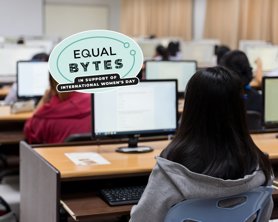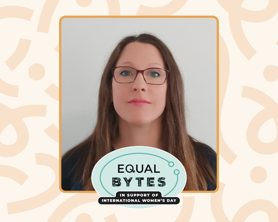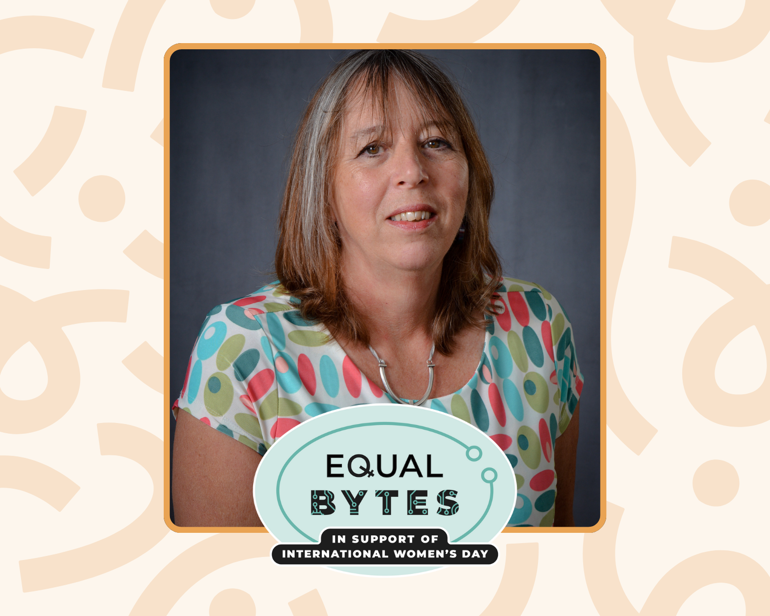Gillian Arnold
Rachel Kay:
Let's start with our first questions about your early inspirations in IT and your career path. What initially sparked your interest in the field of IT?
Gillian Arnold:
I wasn't interested. I didn't care. I went for a job as a secretary at a place called Dixons in North London. The interviewer said, "You're too bright for this. They're recruiting for people in tech at a recruitment agency, go and talk to them."
So I did, and they said, "We've got a great job for you. Do you mind working nights?" And that’s how I became an operator. It was so exciting. I think I was more excited about working nights—I even expected to get a white coat because I thought I was going to be a scientist! Instead, I turned up in my jeans and my punk hairdo.
Rachel Kay:
Brilliant.
Gillian Arnold:
I just thought, this is amazing—it's using all of my brain, and I really felt that was important.
Rachel Kay:
That makes sense. As you progressed, were there any pivotal moments where you thought, "Actually, I’m good at this"? Did you see it as a career, or did you just keep rolling with it?
Gillian Arnold:
Yes, I did. My dad was an electronics engineer, and when I got into the computer suite, I realised it wasn’t scary. If I hadn’t wired plugs and done bits with him as a kid, maybe it would have been more intimidating. But actually, it was so much fun. The people were smart and intelligent, and I wanted to be there.
Rachel Kay:
That’s interesting. People often assume tech is for those who prefer solo working, but you’re describing a lot of teamwork.
Gillian Arnold:
Yes, and I think it’s both. I got a real buzz from problem-solving—working through the night on a problem, figuring out how to fix it. But the teamwork was amazing too. The beauty of technology is that there are jobs for both personalities. If you like deep focus, there’s coding or testing. If you’re sociable, there’s business analysis or sales. It’s such a broad field.
Rachel Kay:
Yeah, absolutely. From your bio, I remember you spent 22 years at IBM. How did your career grow? Did you apply for roles, or were you recruited for specific projects?
Gillian Arnold:
I didn’t start at IBM—I began at a shipping company and spent seven years there. Then I got bored. Seven years seems to be a cycle for me. I’d progressed to shift leader, but I wanted more, so I applied for Citibank and got a job there.
At first, I thought Citibank was a small company—I had no idea it was one of the biggest banks in the world! I led a team, then moved into managing an experimental data centre. Later, I transitioned to a role looking after scheduling, security and operations analysis across the bank.
One day, I quit and went into contracting, quickly securing a role at BT. I wasn’t sure what my long-term plan was—I just knew I didn’t want to stay in that environment.
Then I applied for a job at IBM. I didn’t think I’d get it—I just always wanted to teach technology. During the interview, they gave me an aptitude test, and afterwards, the interviewer said, "That’s the worst test result we’ve ever seen, but you’re so incredibly enthusiastic, and we think you’d be a great communicator. We’re going to give you a try."
When I started, I realised why I’d done so badly on the test—everyone around me was from Oxford or Cambridge. For the first three weeks, I was completely daunted. I thought, "I don’t belong here. They’re all too brainy. I haven’t got a degree. I failed my A-levels because I went to see the Sex Pistols!"
But then they asked me to observe a course with the view of teaching it. At the end of the course, I said, "Why don’t you teach this topic?" They replied, "Nobody uses it." But I knew that we all used it—it was fundamental. They admitted they didn’t fully understand it, and that was my lightbulb moment.
I realised there’s a difference between theoretical knowledge and practical experience. I had real-world expertise that my colleagues didn’t. That moment was pivotal—it made me see that we all have something unique to bring.
Rachel Kay:
That’s such an important message for our students. You described problem-solving, teamwork, enthusiasm, and communication—all crucial skills. We recently ran a webinar on imposter syndrome, and what you said resonates so much.
You’ve always been values-led in your career. Can you share any challenges or barriers you faced as a woman in tech? Were there moments of gender bias, whether conscious or unconscious?
Gillian Arnold:
Rachel, that’s an enormous list!
I started working in 1977, so I came through the 80s when things were very different. It hasn’t entirely gone away, but back then, it was much more blatant.
For example, I was told I couldn’t wear trousers at work. That changed eventually, but it sent a message that you couldn’t be comfortable at work.
I’d attend computer user groups with 200 people, and I’d be the only woman. Because of that, they’d put me at the head table at dinners.
Even now, research shows that women in tech experience more microaggressions than men—small digs that undermine confidence. It means women often have to be extra resilient.
Another challenge is being pushed into admin roles in group work. If you’re a woman in tech, you need to insist on coding, taking on the big tasks, and not just "keeping things organised."
Rachel Kay:
That’s great advice for our students. You’ve always been a strong advocate for diversity, equity, and inclusion. Have you seen organisations making real progress in improving gender diversity in IT?
Gillian Arnold:
Yes! Some organisations are doing fantastic work. One major issue is how women are treated when they take maternity leave. Often, companies isolate them, take away their email access, and make returning to work unnecessarily difficult.
One big bank tackled this brilliantly. They created a job board with short-term projects—things like a two-day job or half a day’s work. Women returning from maternity leave could pick up these small projects to ease back in. It helped them gain visibility across different departments and try out new skills.
It was so successful that they extended it to people returning from long-term illness and then to all employees. It transformed their workplace culture.
Rachel Kay:
That’s such a good example. We do see organisations working hard to encourage women into tech, but I agree—it needs to start at school level. There’s still a long way to go, but at least it’s firmly on the agenda.
That brings me nicely to leadership. As we progress in our careers, technical skills remain important, but leadership becomes just as crucial. You founded your own business, Tekstra—what motivated you to start it?
Gillian Arnold:
It was inspired by a woman I saw speaking at an event. She was 70 and said, "If someone had told me at 50 that I’d be running my own business, I’d never have believed them." I was so impressed.
At the time, IBM was changing its retirement policies, and I thought, "That’s it, I’m going to start my own company."
What’s funny is, you think you know everything—after all, I’d done sales, marketing, product management, and led a research team. But then I started my business and realised I didn’t even know how to create an invoice! There’s always something new to learn.
Rachel Kay:
Absolutely! There’s always something to figure out.
Gillian Arnold:
Yes, always, but it's been incredibly good fun. For a while, we developed software around green IT, which was great. Then, around 2011, companies stopped supporting sustainability in the UK marketplace—though it’s come back now.
Rachel Kay:
Yeah, okay.
Gillian Arnold:
So we had to adapt. As an entrepreneur, you have to change fast. You just have to think, "Right, we’ll do this instead." So we shifted into recruitment—but I hated it.
Rachel Kay:
Yeah.
Gillian Arnold:
That changed when I started recruiting women into tech because it aligned with my values. That’s the key to running your own business—it has to fit with what you believe in.
Then we’d send off CVs for women, and employers would say, "They look good, but let’s have a man’s CV too." I thought, "Hang on a minute—you said you wanted women!" That’s when we started training companies in diversity, equity, and inclusion (DEI). We realised unconscious bias was stopping managers from hiring women, even when they intended to.
Rachel Kay:
Yes, definitely. In your time as President of the Chartered Institute of IT, what initiatives or projects are you most proud of?
Gillian Arnold:
It’s been really good fun. Again, it comes back to my values. I started working on the ethics specialist group because Horizon had just blown up, and it felt really important.
We ran a huge survey of tech workers—around 1,500 responses, which is great in survey terms—asking how important they thought computer ethics was. From that, we wrote a paper which we presented to the government. When they held their big AI ethics conference, we had answers to contribute. That felt like the right thing at the right time, and it was completely values-driven.
Rachel Kay:
That’s fantastic. Looking at the evolution of the IT sector, we can’t ignore the impact of AI. What do you think are some of the most important emerging trends in IT and tech?
Gillian Arnold:
I get really excited about health tech. The ability of new technologies, particularly AI, to make a real difference to people’s lives across the world is amazing.
And now, everything has a "tech"—FinTech, HealthTech, PropTech. There’s a huge expansion of applications across industries. It’s all so exciting. Who wouldn’t want to be in this industry right now?
Rachel Kay:
Yes, absolutely. What’s your view on the industry’s willingness to accept career changers?
For example, someone might have started as a teacher but has always been interested in tech—coding in their spare time—and then decides to retrain and get some qualifications. They just need someone to give them a chance, like you were given at the start of your career. Do you think the industry is open enough to career changers?
We know there’s a talent shortage, and companies need skilled people. Is the sector doing enough to welcome them?
Gillian Arnold:
I do think career changers are important to many companies. The big corporations—KPMG, IBM, BP—are usually the ones driving these initiatives. I’ve come across several organisations actively promoting career restart programmes.
And companies get so much more from hiring career changers. Think about someone who’s had a child and is returning to work. They bring their previous career experience, plus the skills developed through parenting—organisation, multitasking, problem-solving. Now, they’ve also trained in tech. That’s a fully rounded individual. Who wouldn’t want that on their team?
Rachel Kay:
I love that phrase—"fully rounded individual." Many of our students have transferable skills from previous roles or career breaks.
Being a parent, for example, is one of the most demanding yet rewarding jobs. It takes resilience, organisation, and leadership. If someone then retrains in tech, they have a fantastic combination of skills.
Gillian Arnold:
Exactly! Leadership, empathy—these are now seen as key leadership skills, and they’re developed naturally through raising a family.
Rachel Kay:
That’s such a great message, especially for women considering a career in tech. I’ve spoken to women who almost feel they have to apologise for career breaks on their CVs.
Gillian Arnold:
Maybe we should flip that and write on the CV: "During this career break, I learned to…"
Rachel Kay:
Absolutely! "I raised two children, managed a household within a budget, handled scheduling, problem-solving, and crisis management." Employers need to see the value in those experiences. Women should never feel they have to apologise for a career break.
We always encourage our students to highlight their transferable skills.
Gillian Arnold:
Yes, and employers are starting to see the value in them too.
Rachel Kay:
Reflecting on your amazing career, what are the two things you’re most proud of? And what do you want your legacy to be?
Gillian Arnold:
That wasn’t on the question list!
Rachel Kay:
You can have time to think!
Gillian Arnold:
I’m really proud that we wrote a book for IT departments on how to support women in tech. We published it through the British Computer Society (BCS), the Chartered Institute for IT.
We did it because, while women in tech understood the issues, not everyone did. It was important to have a resource for hiring managers and IT leaders, not just for women.
Rachel Kay:
That’s fantastic. It’s not just about women supporting women—it’s about getting the whole industry on board.
Gillian Arnold:
Exactly. It’s not the women’s job to fix the imbalance. It’s about changing the way companies approach hiring and retention.
As for legacy… I’ve had some incredible experiences. I wrote technical manuals for IBM in the US and lived there for a while—that was brilliant. I led a collaboration between IBM, Cardiff University, and two independent companies to develop Healthcare at Home.
We were working on a contact lens that could measure glucose levels in the eye, linking it to diabetes management. The idea was to take a signal from the body and send it to a mobile app. This was in 2003—long before the glucose-monitoring patches that are now widely used. We were working on the early concepts that helped pave the way for that technology.
Rachel Kay:
That’s incredible. To see how that technology has evolved and is now helping people—it must be so rewarding.
Gillian Arnold:
Yes, absolutely. That’s why HealthTech is so important to me. The things people are working on today will be life-changing in the next 10 years.
Rachel Kay:
Completely agree. Finally, what are your top tips for women entering the tech sector?
Gillian Arnold:
Believe in yourself.
Notice when you’re being gaslighted or mansplained, and call it out. Do it with humour if needed—"Haha, you’re mansplaining me!"—but make sure you’re setting boundaries. That’s how you retain your confidence and self-worth.
Rachel Kay:
Yes, making it clear but not confrontational.
I’ve worked in male-dominated industries for 35 years, including 20 in the defence sector. Sometimes, men don’t realise how they’re coming across. By calling it out, you make them aware, and often, they’ll change their behaviour. Sometimes, bias is intentional, but other times, it’s unconscious. Either way, you should always feel able to say, "That made me feel uncomfortable."
Gillian Arnold:
Exactly. Our research found that men often don’t notice microaggressions happening. Women see them, but men don’t—because it’s not happening to them. That’s why it’s so important to call it out.
Rachel Kay:
Yes, absolutely. Well, you’ve been amazing! We’ve really enjoyed this conversation. Your insights will inspire so many people, both men and women, and help them navigate their careers in tech. Thank you so much!
Related Articles
 Women in Tech
Women in Tech5 reasons women make great coders
If we trace the origins of computer programming, 75% of codebreakers at Bletchley Park were women and engineering at NASA was predominantly performed by women.
Read More Tech
TechInclusivity in Cyber Security | An interview with Rob Black
In this insightful conversation, Rob Black, a prominent figure in the UK cybersecurity industry, discusses the importance of creating an inclusive and supportive environment for everyone, regardless of background or gender.
Read More Women in Tech
Women in TechMary Kenneth Keller: A trailblazer for women in tech and education
Mary Kenneth Keller was a computer science pioneer who led the way for women in both tech and education. Discover her contributions and how she continues to inspire more women to pursue careers into STEM.
Read More Tech
TechLife in Cyber Security | An interview with Karine Tobin
If you're curious about breaking into cybersecurity or simply need a boost of motivation to pursue your goals, this conversation is packed with insights on resilience, the power of networking, and why finding your “why” makes all the difference.
Read More

